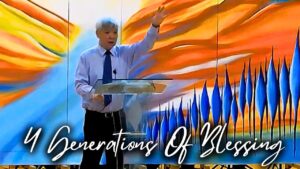By: Rev. Carlos Barcelona Jr.
Ephesians 2: 10 – “For we are his workmanship, created in Christ Jesus for good works, which God prepared beforehand, that we should walk in them.”
When a person works an eight-hour day and receives a fair day’s pay for his time, that is a wage. When a person competes with an opponent and receives a trophy for his performance, that is a prize. When a person receives appropriate recognition for his long service or high achievements, that is an award. But when a person is not capable of earning a wage, can win no prize, and deserves no award—yet receives such a gift anyway—that is a good picture of God’s unmerited favor. This is what we mean when we talk about the grace of God.
Jonah 2: 9 says, “Salvation is of the Lord.” God works on behalf of sinners and He does it in 4 ways.
1. He loves us
Love is one of God’s fundamental attributes, but when this love is related to sinners, it becomes grace and mercy. We are not saved “by God’s love,” but by His grace and mercy. In His mercy, He does not give us what we deserve. And in His grace He gives us what we do not deserve. And all of this is made possible because of the death of Jesus on the cross of Calvary, which is a display of his love.
2. He quickens us
He made us alive even when we were dead in sins. In the 4 gospels, it is recorded that Jesus raised 3 people from the dead: the widow’s son (Luke 7:11- 17), Jairus’ daughter (Luke 8: 49- 56), and Lazarus (John 11:41- 46). In each case, He spoke the Word and this gave life. “The Word of God is quick and powerful” (Heb. 4: 12). These 3 physical resurrections are pictures of the spiritual resurrection that comes to the sinner when he hears the Word and believes. (John 5: 24)
3. He exalts us
We are not raised from the dead and left in the graveyard. Our physical position may be on earth, but our spiritual position is “in heavenly places in Christ Jesus.”
4. He keeps us
God’s purpose in our redemption is not simply to rescue us from hell. His ultimate purpose in our salvation is that for eternity, in the works of our hands and the walks of our feet we might glorify Him.
Salvation cannot be “of works” because the work of salvation has already been completed on the cross. This is the work of God for us, and it is a finished work. We can add nothing to it, and we dare take nothing from it. Sin worked against us and God worked for us, but the great work of conversion is only the beginning.
There are 3 main points taken from Ephesians 2:10.
1. God’s Work In Us.
2. God’s Work Through Us.
3. Walking God’s Work
I. GOD’S WORK IN US
The Greek word translated “workmanship” is poiema, from which we derive our English word poem. It means “that which is made, a manufactured product.” In other words our conversion is not the end; it is the beginning. We are a part of God’s “new creation” and God continues to work in us to make us what He wants us to be. His purpose is to make us more like Christ. (Rom. 8: 28)
Too many Christians think that conversion is the only important experience, and that nothing follows. But this is wrong. Let us take a look at the resurrection of Lazarus as an example. After Jesus raised Lazarus from the dead, He said, “Loose him, and let him go.” (John 11: 44) In other words Jesus was saying, “This man is now alive. Get him out of the grave clothes!”
Paul had this concept in mind when he wrote Ephesians 4: 22- 24, “That ye put off concerning the former behavior the old man, which is corrupt… and that ye put on the new man, which after God is created in righteousness and true holiness. Also in Colossians 3:1 he said, “Since ye then be risen with Christ, seek those things which are above.
God is working in us to conform us to Christ. He cannot work in us unless He has first work for us, and He cannot work through us unless He works in us.
God shows us many example of this principle.
Moses – God spent 40 years working in him before He could work through him. at the beginning of his ministry, Moses was hasty and depended on his own strength. He killed an Egyptian and had to flee Egypt. But during those 40 years as a humble shepherd in the desert, he experienced God’s working in his life, a working that prepared him for 40 more years of magnificent service.
Joseph – he suffered for 13 years before God put him on the throne of Egypt, second to Pharaoh.
David – was anointed king when he was a youth, but did not gain the throne until he had suffered many years as an exile.
Paul – he spent 3 years in Arabia after conversion, experiencing God’s deeper work to prepare him for his ministry.
Let God do the work in us and my next point is:
II. GOD’S WORK THROUGH US.
In nature, lightning and thunder present a striking illustration of the relationship between faith and works. When lightning flashes across the sky, we know that the roar of thunder will follow. Without lightning, there would be no thunder, because the one is the cause of the other.
In the same manner that thunder contributes nothing to lightning, good works add nothing to our salvation. Rather, they are the “sound” of faith and will follow every genuine conversion experience. The one without the other is not the real thing.
We are “created in Christ unto good works.” We are saved unto good works.
The famous theologian John Calvin wrote, “It is faith alone that justifies, but faith that justifies can never be alone.” James chapter 2 points out that saving faith always results in a changed life. It is not enough to say that we have faith; we must demonstrate this faith by our works. I believe, a changed life is a powerful life that can release bondages and destroy strongholds.
The Bible speaks of many different kinds of works.
– The works of the law which cannot save. Gal. 2: 16
– The works of the flesh. Gal. 5: 19
– The works of darkness. Rom. 13: 12
– Dead works. Heb. 6: 1
– Works of righteousness. Titus 3: 5
Matthew. 5: 16 says, “Let your light so shine before men, that they may see your good works and glorify your Father which is in heaven”
The Word of God instructs us to:
– Abound in every good work. . 2 Corinthians. 9: 8 “And God is able to bless you abundantly, so that in all things at all times, having all that you need, you will abound in every good work
– Be fruitful in every good work. Col. 1: 10 “so that you may live a life worthy of the Lord and please him in every way: bearing fruit in every good work, growing in the knowledge of God,”
– Be thoroughly equipped for every good work. 2 Timothy. 3: 17 “so that the servant of God may be thoroughly equipped for every good work.”
– Be zealous of good works. Titus 2: 14 “who gave himself for us to redeem us from all wickedness and to purify for himself a people that are his very own, zealous to do what is good.”
Why should we abound, be fruitful, be equipped and be zealous for good works?
– Good works are the results of the work of God in our hearts. Philippians 2: 13 – “It is God which worketh in you both to will and to do of His good pleasure.”
– They are the evidence that we have been born again. Matthew 7: 21, “Not everyone that saith unto me, ‘Lord, Lord,’ shall enter into the kingdom of heaven; but he that doeth the will of my Father which is in heaven.”
– They are a testimony to the lost. 1 Peter 2: 12, “Live such good lives among the pagans that, though they accuse you of doing wrong, they may see your good deeds and glorify God on the day he visits us.”
We are all given certain gifts so that we can bless others, and we are to be faithful in doing that. Since God made each of us unique, you do not need to compare yourselves with others, or copy what others are doing. You are different, but you are given some gifts and you need to do something with them. Whenever you see a need right in front of you, God is giving you the opportunity to practice serving. If you see that someone has a need, at school, in your office or here in this church, God is giving you the chance to practice serving – to “do the good works which He has prepared in advance for you to do.”
E.g.
Several years ago two teenage boys tried to come into a church service at night, but it was packed and they couldn’t find any seats. So they turned around and decided to leave.
But one usher saw them and called them back, “Come, let me find you a seat”. And that usher personally escorted them, down to the center and set them in the middle and found them two seats.
That night both of those boys accepted Christ and became Christians. One of them was Billy Graham, who became an evangelist and led many to Christ.
There’s more to life than eating, sleeping and playing. There are things we have to do, but beyond that there is the ultimate goal of reaching out to a hurting and dying world with the love of Jesus Christ.
God is doing His work in us and through us.
III. WALKING GOD’S WORKS
As we walk the works of God:
1. We need to walk in Sincerity.
It is a Latin word, meaning “without wax.” The Greek term means “sun-tested. The ancients had a very fine porcelain which was greatly valued and therefore expensive. Often when fired in the furnace tiny cracks would appear. So dishonest merchants would smear pearly-white wax over these cracks which would pass for true porcelain – unless held up to the light of the sun. Honest dealers marked their flawless wares sine cera – “without wax.”
We must allow sincerity to be our badge of excellence throughout our days on earth. No sham, no hypocrisy. When true sincerity flows from our lives, things that are excellent are approved.
Philippians 1: 10, “so that you may approve what is excellent, and so be pure (sincere) and blameless for the day of Christ”
2. We need to walk in Singleness.
Singleness means clear, sound or healthy.
If we are to become single, we must be sound with our feelings and motives. We should be clear with ourselves and with others. In Ephesians 6:5 Paul exhorts us to be obedient in our works towards others with singleness. We are to serve with true feelings not requiring or expecting anything in return.
James warns us that when we are not single-minded, we become unstable in all our ways. Double-mindedness is a common disease that leaves its victim paralyzed by doubt… hesitant, hypocritical, full of theoretical words, but lacking in confident action. When we are not single-minded, we will not receive anything from the Lord.
The single-minded are short on creeds and long on deeds. When they care, they really care. When they humble, they are truly humble. When they love, they genuinely love.
3. We need to walk in Sacrifice.
Sacrifice is a life given to serve people. It suggests 2 things:
– Yielding up our Rights.
Several years ago the Public Library in a certain town had a service called “Dial-A-Tale.” Anytime a young child wanted to hear a fairy tale, he or she could call the number and listen to a pre-recorded reading of a short fairy tale. Unfortunately, however, the telephone number was only one digit different from the home of a minister named Tom Erickson. Because the children often made a mistake in dialing the number, Tom would get frequent calls from a child looking for a fairy tale.
After numerous unsuccessful attempts to explain to the children that they had dialed a wrong number, Tom felt he had only one alternative. He obtained a copy of Three Little Pigs, and set it by the phone. So whenever a child calls, he simply reads them the tale.
This is a beautiful illustration of yielding personal rights. Tom Erickson had the right not to have to answer these calls. He had the right to avoid the invasion of his privacy. He had the right to change his telephone number. But he willingly gave up those rights and ministered to the needs of children.
For us today, we have the right to our privacy, right to our income, right to our vacation but God wants us to willingly yield those rights to minister to the needs of the lost and needy.
– Yielding up our Lives.
The story of a man by the name of Abraham Bininger. Born in Switzerland in the 17 hundreds he and his parents left their homeland and boarded a ship for America. During the journey both his father and mother died and were buried at sea. While just a boy he found himself in a strange land where he knew absolutely no one. However he never let his misfortunes hold him back. As a young man he professed Christ as his Savior. After hearing of the great misery and poverty among the blacks on the St. Thomas he sought to travel there to preach the gospel.
Upon his arrival he discovered that it was against the law for any person but a slave to preach to the slaves. It was the policy of the plantation owners to keep the blacks in ignorance and superstition.
Shortly after this the governor received a letter from the Bininger. In the letter Bininger pleaded with the governor to allow himself to be made a slave for the rest of his life. Bininger promised that he would serve as a slave faithfully, provided he could give his leisure time to preaching to his fellow slaves.
The governor in turn sent the letter to the King of Denmark who was so touched by the willingness of Bininger to sacrifice his freedom for the gospel that he sent an order that allowed Abraham Bininger to preach the gospel whenever and where ever he choose, to black or white, to slave or freeman.
CONCLUSION:
When you read the Book of Ephesians, it talks about our lives from grave to grace. It shows us the privileges and the blessings we have in Christ. Privileges and blessings we don’t deserve but made possible for us. All we need to do now is to let God do His work in us, to change us into the likeness of his Son in our character, let God do His work through us and carefully to walk that work.
A church organist was practicing a piece by Felix Mendelssohn and not doing too well. Frustrated, he gathered up his music and started to leave. He had not noticed a stranger come in and sit in a rear pew.
As the organist turned to go, the stranger came forward and asked if he could play the piece. “I never let anyone touch this organ!” came the blunt reply. Finally, after two more polite requests, the grumpy musician reluctantly gave him permission.
The stranger sat down and filled the sanctuary with beautiful, flawless music. When he finished, the organist asked, “Who are you?” The man replied, “I am Felix Mendelssohn.” The organist had almost prevented the song’s creator from playing his own music!
There are times when we too try to play the chords of our lives and prevent our Creator from making beautiful music. Like that stubborn organist, we only reluctantly take our hands off the keys. As His people, we are “created in Christ Jesus for good works, which God prepared beforehand” (Ephesians 2:10). But our lives won’t produce beautiful music unless we let Him work through us and we walk the works of God.





